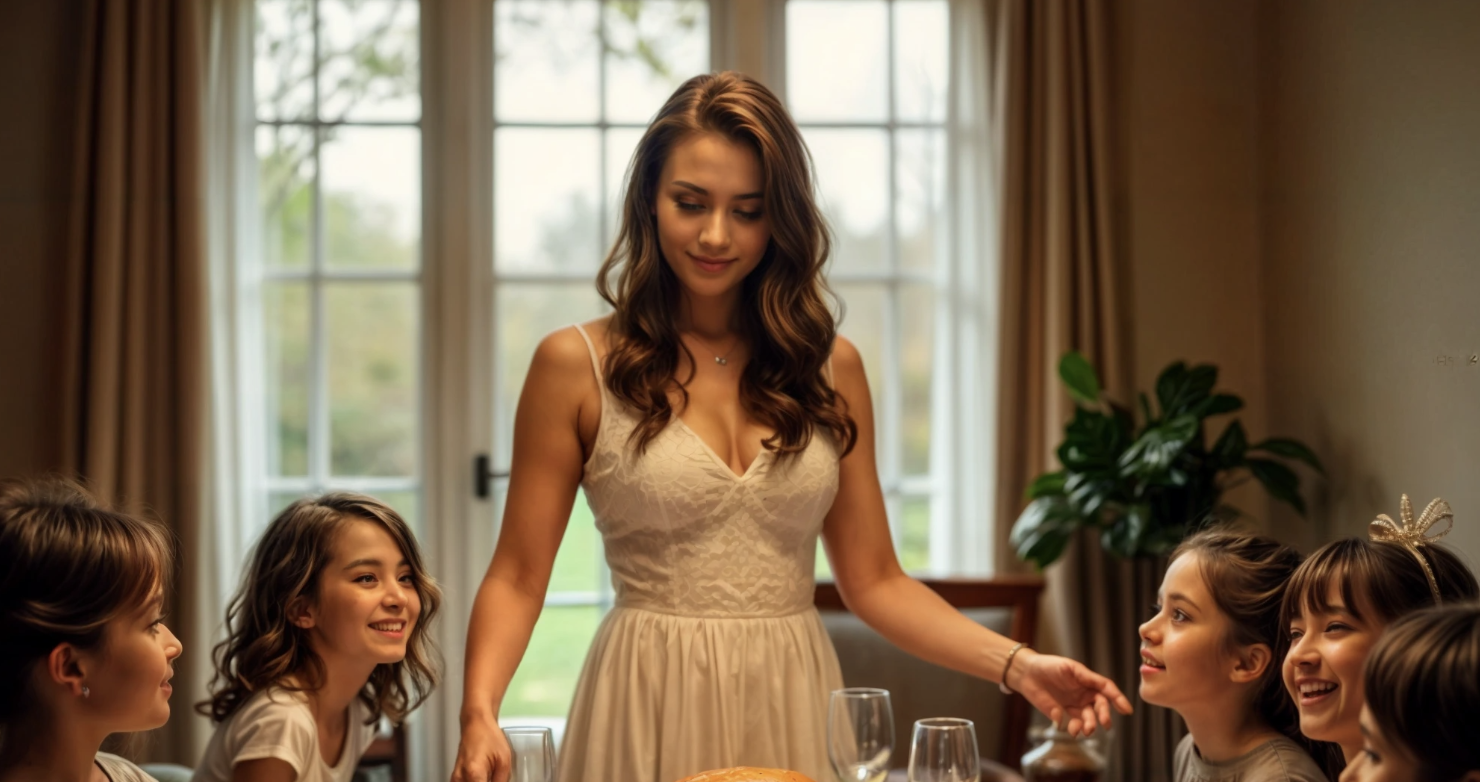The pancakes were frying, as always, on autopilot — the frying pan was old, its coating had died back in 2014, but Maria refused to replace it on principle. The pan had character. Unlike most of the inhabitants of this apartment.
The kitchen smelled of smoke — Maria didn’t smoke, but yesterday the neighbor Ira had come “for five minutes.” They left at three in the morning, a bottle shared between the two, talking about men, housing and utilities, life, and, of course, about Irina — the very same one. The daughter-in-law. Maria now even pronounced the name with effort, as if swallowing a fishbone.
“Well, that’s that,” she muttered, sliding the last pancake onto a plate. “Good morning, country that doesn’t know what ‘I’m tired’ means.”
Maria wiped her hands on her apron and sighed. She wanted to lie down. Just lie down and not get up. Or at least have someone hear her, ask: “How are you?” But no. Nobody had asked in five years.
The phone rang sharply, like in a bad TV series. Maria glanced — Alexey. The eldest. Like his father, his tone was businesslike even on the phone.
“Hi, Mom. We’ll be there in twenty minutes.”
“Who’s ‘we’?” Maria became cautious.
“Well, me, Irina, the girls. Alisa and Nastya. You’re home, right?”
“Lyosh, maybe you’re confusing me with a hotel?” Maria asked ironically, gripping the handset. “I was actually planning to…”
“Mom, enough already,” her son replied tiredly. “We’re already on our way. Come on, kisses. And make some coffee.”
“…Don’t choke on that coffee,” she said through gritted teeth as the phone beeped and went silent.
She spent twenty minutes clearing crumbs off the table, cleaning the cat’s litter box, and putting on a proper robe — not the one with a hole under the armpit. She wanted to put on makeup but gave up — let them see that their mother was aging and sick. There should be some truth somewhere.
The door slammed. They came in like a stormtrooper unit. Immediately shouting, with bags, heavy breathing, and Irina’s smell of expensive but somehow irritating perfume.
“Mommy, hi!” Irina exclaimed, entering like the hostess. “Oh, pancakes? How you spoil us!”
“I was frying them for myself, actually,” Maria said dryly. “But yes, now they’re for you.”
“Oh, you’re always like that,” Irina waved her hand and started unpacking bags on the kitchen table. “We brought groceries; we’re staying a while.”
“What do you mean, ‘a while’?”
Alexey had already placed his suitcase by the wall, taken off his jacket, and said:
“For about a week. Our apartment is being renovated. Mold in the bathroom. We decided it’s more convenient to wait it out at your place.”
“Of course, convenient,” Maria said. “Especially for you.”
Especially when Mom is responsible for everything, and you don’t even bother to call ahead.
Alisa, the eldest girl, came over and kissed Maria on the cheek.
“Granny, don’t grumble, okay? We missed you. I really missed you.”
“Uh-huh,” Maria muttered but still squeezed Alisa’s hand.
Nastya immediately sat down at the table, grabbed a pancake, and said with her mouth full:
“Does your internet work?”
“Yes, Nastya, it works. If you don’t shut it off with cartoons like last time.”
“What’s wrong with that?” Irina said, taking cream out of her bag and skillfully spreading it on her hands. “Cartoons are sacred.”
“Yes, especially at three in the morning. With headphones, of course.”
Her son seemed not to hear anything. He already reached for the pancakes:
“Mom, as always, you’re the queen of the kitchen. I love your pancakes. We’re home.”
Maria looked at her son. At his hair, slightly graying at the temples. At his hands, which had become just like his father’s. Her son, grown up, had become almost a stranger. And the phrase “We’re home” sounded like a slap.
I am the home, and you are guests who think it all belongs to you.
She went to the bathroom. Locked the door. Turned on the water. Sat on the edge of the tub and wept. Quietly, briefly, but sincerely.
That evening there was a play. Maria had bought the ticket in advance, thinking she’d go alone — a comedy, a famous actress, costumes, something she had dreamed of for a long time.
“Mom, seriously?” Irina raised an eyebrow seeing her in a coat. “Right now?”
“Yes, seriously.”
“Well, are we the only ones left? No food? No supervision?”
“You’re grown-ups,” Maria smiled tightly. “Or did you come here with a note?”
Alexey interjected:
“Mom, wait. We thought you’d sit with us. We ate your pancakes — that was breakfast. What about dinner?”
“He who eats also cooks,” Maria said calmly. “You have the keys. I’ll be back soon.”
She left. On the stairs, she held onto the railing — her head was spinning. In the evening she didn’t go to the theater. She just went down to the yard, sat on a bench, and stayed there for about two hours. Nobody needed her. Not even herself.
In the morning she woke up with a fever. Her back ached, legs ached. Nobody noticed. Everyone was eating cereal and giggling.
“Mom, we have a favor to ask,” Irina started at breakfast. “Could you look after Nastya starting Monday? Alexey and I will be at the office, Alisa at school…”
“I’m sick,” Maria said quietly. “I feel bad.”
“Well, you know, none of us are exactly sugar right now,” Irina snorted. “Who’s healthy nowadays?”
Alexey didn’t even look up from his phone. He only nodded:
“Hang in there a little. Help out.”
Maria got up. Went to the window. Looked at the tree in the yard. Dirty, crooked. And suddenly she understood: Enough. That’s enough. Everything.
“I’m not a nanny, not a free laundry service, nor a social aid agency. I am a person. Got it?”
“Mom, what’s wrong?” Alexey asked confused.
Maria turned sharply:
“I’m leaving. Going away. And don’t ask where. If you want to live in this apartment — live. But without me.”
And she started packing her suitcase. Finally — for herself.
The suitcase was old, from their Sochi vacation with Volodya. The wheels squeaked, the zipper stuck, but Maria dragged it like a flag. Through the apartment — like across a battlefield. From room to room, ignoring gasps and questions.
“Mom, are you serious?” Alexey ran after her in just socks, a crumpled t-shirt, and a stunned face.
“Serious,” Maria snapped. “I gave birth to you, raised you, and even made pancakes for you. That’s enough for one life cycle.”
“You’re sick!” Irina objected. “Where will you go with a fever?”
“Don’t worry. It’s warmer in hell than in your kitchen.”
She slammed the suitcase shut like a coffin. Looked at Irina. She was standing with a cup of coffee — the same one Maria had made out of habit. Automatically.
“You could have asked how I’m feeling, by the way.”
“Well, I did… kind of,” Irina mumbled. “Yesterday.”
“There’s a gulf between ‘kind of’ and ‘really,’ Irina. As wide as the gulf between ‘family’ and ‘a convenient household resource.’”
Her son was silent. For the first time, he didn’t know what to say. And it was even pleasant — to see that he, a lawyer, had no prepared speech.
“Where are you even going?” he gave up.
“To a sanatorium,” Maria said. “I was given a voucher back in January. From the clinic. But I kept putting it off. Because you, see, are ‘always busy.’ Now I decided: enough. Let busy people be with themselves. Without those who always cover for them.”
“We could sit down and talk,” Alexey tried again. “This all happened so suddenly…”
“Suddenly? You’re just seeing the mild version. I could’ve called movers and handed you the keys through the precinct officer.”
She put on her coat. Went to the hallway mirror. Looked at herself. Surprised — her face was gray, tired, but not pathetic. On the contrary — even determined.
The kids crawled out of the room, Nastya yawning, Alisa buried in her phone.
“Granny, are you really leaving?”
“Yes, dear.”
“And pancakes?”
Maria smiled. A real smile. For the first time in months.
“When you start making them yourself — there will be pancakes. I’ll teach you if you want. But not here. At my place.”
She left, leaving the suitcase by the door. No need to return: Alexey was the first to run out and hand it to her. Silently. Not even looking her in the eyes.
She spent two weeks in a suburban sanatorium. Without a phone. Without a kitchen. Without “Mom, you should…” Just walking, breathing, eating, sleeping. Amazingly, her fever broke in the first three days. It turned out the body heals if it’s not burdened by someone else’s foreign lives.
On the sixth day, Alexey called. First, Irina texted — dry, official: “We left the keys with the concierge. We moved out. Thanks for the hospitality.”
Then the son:
“Mom… forgive us. We probably… well, you know. Without you, it’s like without a foundation. Everything’s cracking.”
“If it’s cracking, it means it was built on the wrong foundation,” Maria replied calmly.
He was silent. Then said:
“We want to visit. But for real. Without bags, without suitcases. With wine and without demands.”
“We’ll see,” she said. “I just started liking the air here.”
Back home, Maria took off her apron. Hung it deep in the closet, behind winter coats. On the kitchen table was a bag from Alisa — hand-drawn: “For Granny.” Inside were tea, a card, and chocolate.
She put on the kettle. And for the first time — not on autopilot. But for herself. Only for herself.
She returned like a general after a long campaign. Without fanfare, but with clear eyes. There was no jam, no pajamas for guests, no jars of homemade preserves in her bag. Only a couple of new books, face cream, a robe, and a sheet with the sanatorium treatment schedule — she now liked it like a magic scroll.
Maria entered the apartment and first took off her apron from the coat rack. Turned it over in her hands — like a foreign thing.
“No more need for this,” she said aloud. And carefully folded it on the top shelf. Let it stay. For the archive.
The house was quiet. Alexey and his family had really moved out — only a vase of pistachios (Irina loved them) and a fridge magnet of the sea covering the “what to buy for dinner” list reminded her of them.
On the fifth day of silence, someone rang the doorbell.
She opened — Alexey stood on the doorstep with two bags, and behind him were Alisa and Nastya. Irina, Maria noticed, was absent. And that felt… peaceful.
“May we come in?” her son asked hesitantly.
“Are you here for an inspection or a visit?” Maria raised an eyebrow.
“We’re here for you. To sit. Just. Like human beings,” he said quietly, as if afraid to scare her off.
Maria stepped aside. Without smiling, but without slamming the door. They came in, took off their shoes carefully — like in a museum.
“I bought your favorite waffles with chocolate. And Alisa brought herbal tea. Nastya, as you see, is hungry again. So, if there’s any…”
“If there’s any, you’ll find it yourself. The fridge isn’t an alien object.”
Nastya snorted. Alisa smiled guiltily.
“We’ll manage. Promise. Just tell us how you’re doing…” Alisa moved closer.
Maria put the kettle on. Not out of obligation — just because she wanted to.
“It was good. I slept without an alarm for the first time. Woke up without thinking who was hungry, who overslept. Imagine that?”
“Hard to imagine,” Alexey chuckled.
“Exactly. Now listen: I have new rules.”
She poured tea without pausing her monologue:
“First. No unannounced visits. Even if you’re downstairs with a cake and a guilty face. Second. I don’t have to be ‘on call.’ I’m not a dispatcher. Not a nanny. Not a back office. I’m Maria. And now I have three jobs: to live, to rest, and to be happy.”
“And the pancakes?” Nastya asked with puppy-like hope.
“On Sundays. If you come with already washed dishes.”
“How’s that?”
“Buy your own and bring them. Or wash them downstairs. I’m not a kitchen hostage anymore.”
They laughed. Not out of politeness — genuinely. Because for the first time in many years, a mother spoke not as a resource but as a woman.
That evening, when the guests left, she closed the door not with relief but with calm warmth. Like a person who has put everything in its place.
The next day, the doorbell rang again. At the door — Irina. With a bag, in a coat, and with a tense face.
“We need to talk,” she said, lowering her eyes.
“Not here,” Maria replied calmly. “I live here now. And sorting things out — that’s at a café. Or in court. You love everything official, after all.”
“Maria Ivanovna…” Irina began, but Maria raised her hand:
“Think it over. Meanwhile, I’ll live. Try not to be convenient. But to be alive.”
She closed the door. Softly, but with finality.
That evening, Alisa wrote in the messenger:
“Granny, you’re like a princess now. Only without a castle. We’re proud of you.”
Maria smiled. And placed a small cactus on the windowsill. It was stubborn, like her. And prickly — for a reason.



